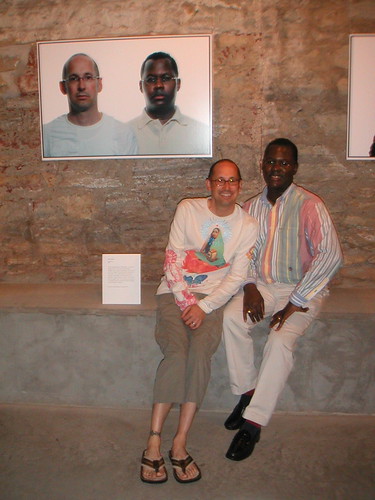I don't normally quote an entire column, but this gay dad's (Dan Savage) article about attacks on gay parents is so on target I had to. It came from
The Stanger, a Seattle newspaper.
"My son had a fever, and it was spiking—103, 104, 105. The nurse on the phone told us to fill a tub with cold water, dump in whatever ice we had in the freezer, and set him in the bath to break his fever. Five minutes later we were standing in the bathroom, empty ice trays in the sink, watching the tub slowly fill with cold water. I didn't have the heart to do it—I couldn't just set my feverish, distraught son into a tub full of ice water. So I did what any decent parent would do: I got undressed, stepped into the tub first, and sat down. Then my boyfriend handed our son to me. We sat there together, ice cubes floating around us, my son's thin, warm arms wrapped around my neck, until his fever broke.
My partner and I adopted eight years ago. Like any other couple who wants to adopt, we had to earn the right to sit in tubs filled with ice water—and catch vomit in our cupped hands, enjoy week-long sleep-deprivation marathons, and all the other perks of parenthood. We had to open our financial records for inspection, submit to criminal background checks, and welcome social workers into our heads. When the time came, the courts in the state where we adopted treated us like any other couple, allowing us to do one expensive joint adoption rather than two twice-as-expensive single-parent adoptions [John and I will have to do two single-parent adoptions here in Indiana].
At the time we adopted, only one state—Florida—banned adoptions by same-sex couples. Now it is illegal in half a dozen states, and if the American Taliban gets its way, soon it will be illegal in more. USA Today reported in February that religious conservatives, emboldened by their successful efforts to pass anti-gay-marriage laws and get anti-gay-marriage amendments approved in dozens of states, are planning to push for bans on adoptions by same-sex couples.
"Now that we have defined what marriage is, we need to take that further and say children deserve to be in that relationship," Greg Quinlan, a conservative activist, told USA Today. Anti-gay-adoption laws are being "drafted or discussed," according to USA Today, in Alabama, Alaska, Arizona, Georgia, Indiana, Kansas, Kentucky, Michigan, Missouri, Ohio, Pennsylvania, Tennessee, Utah, Vermont, Virginia, and West Virginia.
And in Oregon too, the state where my boyfriend and I adopted our son, the state that eight years ago treated us like any other couple.
The arguments social conservatives use against adoptions by same-sex couples are every bit as dishonest as the arguments they employ against same-sex marriage. They point to studies that show children with married parents do better than those with single parents
(ignoring the fact that these studies measure the benefits of having two parents, not two opposite-sex parents), and they refuse to acknowledge the existence of numerous studies that show children raised by same-sex couples do just as well as children raised by heterosexual couples.
Perhaps most infuriating, opponents of adoptions by gay and lesbian couples seek to create the impression that there is a home—a heterosexual home—for every child waiting to be adopted. All children deserve, the religious right argues, a mother and a father. It's a blandly appealing nod to normalcy that masks an insidious insult: When it comes to adoption, any heterosexual couple—any heterosexual couple at all, however dysfunctional—is preferable to even the healthiest homosexual couple. All same-sex couples are, by definition, unfit to parent.
The right has been allowed to frame this debate thus far, but I believe we can reframe it by demanding that any effort to outlaw adoptions by same-sex couples be followed to its logical conclusion. If gays and lesbians are unfit to parent any children we might adopt, then we are surely unfit to parent the children we have already adopted. We should demand that any bill banning adoptions by same-sex couples include a provision that would require the state to remove children from the homes of same-sex couples. Adopted or biological, if the state believes that gays and lesbians are unfit parents, how can they leave the kids we're already parenting in our homes?
It's difficult to know exactly how many American children are being brought up by same-sex couples; estimates range from anywhere between 250,000 and 10,000,000. But we know how many children there are in foster care in the United States: 500,000. The foster-care system is universally acknowledged to be bankrupt and broken, so dysfunctional that it amounts to state-regulated child abuse. There aren't enough prospective parents—single, married, gay, straight—willing to adopt the kids who are currently in foster care, much less the hundreds of thousands or millions of children who would be added if the state were forced to find homes for all the children currently being raised by gay and lesbian couples.
If such a provision were attached to anti-gay-adoption laws, the religious right would no longer be able to argue about what is or isn't in the best interests of hypothetical children who may or may not be adopted in the future, but rather what's in the best interest of real children, children who have already been adopted, children who already have homes and parents. The debate would shift from how hypothetical children might do in our homes to how our real children are currently doing in our homes—and studies show they're doing fine, thank you very much. My proposed amendment to anti-same-sex-adoption laws would instantly deprive religious conservatives of their emotionally manipulative every-child-deserves-a-mother-and-a-father argument.
Instead they would be required to make a much tougher argument: that a potential lifetime in a dysfunctional foster-care system—older children are notoriously hard to place for adoption—would be better for my child than the life my partner and I are giving him. They would have to argue that it would be in my son's best interest to be taken from the father who sits in ice water with him when he has a fever and from the father who takes him to school every day. The religious right would have to argue in favor of taking everything that belongs to him from our home—his skateboard, his football, his first- and second-grade schoolwork, his beloved one-eyed dog. In addition to taking my son from his parents, the religious right would have to argue for taking him from his grandparents, his aunts, his uncles, his cousins, his friends, his teachers, his babysitter.
It is an argument they would lose."












